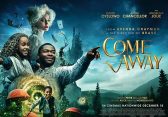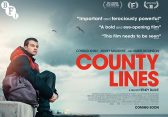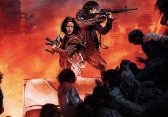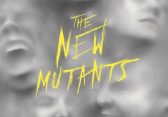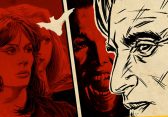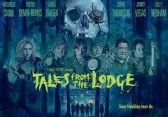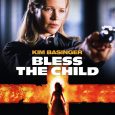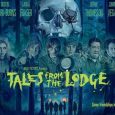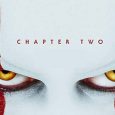Iron Monkey (Eureka Classics Release)
Originally released 1993 (Eureka Classic version 2018)
The corrupt governor of a local town is beset by a masked vigilante called the Iron Monkey. A stranger who is passing through is mistaken for the criminal due to his unusual proficiency in Kung Fu. When it's revealed he isn't the Iron Monkey, the governor instead kidnaps his son and forces him to find the criminal. With his son's life in the balance, the stranger has no choice but to agree.
Yeun Woo-ping
Donnie Yen, Yu Rongguang, Jean Wang, Angie Tsang, James Wong
90 minutes
Night time – an unnamed town and an unnamed date. A masked figure leaps across the roof tops unseen as people indoors complain about the cold and the scoundrel governor who is squeezing them all dry.
Said governor (TV host James Wong) and his seven mistresses aren’t sleeping so happily though. Recently the “Iron Monkey”, a black-clad vigilante, has been attacking not only his estate, but those of other wealthy and corrupt officials across the province. The Governor is low on cash and Christ if the Emperor finds out he’ll be out of a job too.
Suspecting an attack that very night, he has a cadre of guards lead by the well-meaning but bumbling Fox protecting his stash. Accompanied by four Shaolin warriors, surely even the Iron Monkey couldn’t succeed? Well you don’t know the Iron Monkey. Allow me to acquaint you with him.
Iron Monkey doesn’t even try any sneaky Batman tactics. He just jumps in the front door and starts kicking ass. He’s perfected the “stand on your head and kick you in the face” technique, that only Kung Fu masters can pull off. He easily outmatches everyone, and makes off with the gold. He then proceeds to hand it out to all the poor, starving and desperate folk of the town.
The Governor, furious at their failure, docks Fox and his men a month’s salary, before commanding them to find the masked villain. Concerned that the wounds of his men can’t be tended to with spit balls and hope, Fox visits the kindly Doctor Yang Tianchun (Yu Rongguang, New Police Story) the next day.
The good doctor and his assistant Orchid run a busy clinic, tending to the rich and poor alike. Giving away his medicine for free to those that can’t afford it and charging the rich folk out the ass (for “better medicine”), he’s well regarded by all in town. He even gives some special healing brew to Fox for him and his men free of charge. What a guy! Fox returns the favour by throwing out some deviant scumbags who get all touchy feely with Orchid.
But he need not have bothered though because both Orchid and the Doctor can handle themselves. For of course Yang is only a doctor by day. By night he dons the mask and black costume of the Iron Monkey. Bothered that positions of power (such as the Governor’s) can be bought and sold with gold, he’s tired of the corruption that is ruining the world. The Iron Monkey is his way of righting the wrongs, defending the defenceless etc. He’s even taught Orchid some skills – she’ll later dominate some more Shaolin warriors who bust in on the clinic. Big mistake!
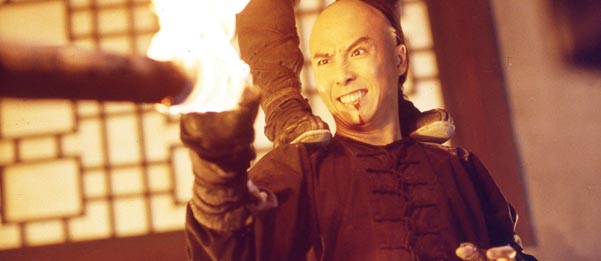
After a letter arrives for the Governor saying he is to be investigated, he has his troops scour the town for anyone who looks like, acts like or even smells like Iron Monkey. It’s here that the young widower, Wong Kei-Ying (Donnie Yen, Rogue One: A Star Wars Story) and his son Wong Fei-Hung come into the picture.
Merely passing through town, Kei-Ying gets involved with some street thugs who try to pick his pocket. He easily bests them using the secretive Kung Fu of his home province, Canton. Indeed, people have heard of both him (“the last of the Ten Tigers”) and his powerful move, the No Shadow Kick – a blow of such blazing speed that no one sees it coming.
Nearby troops see the skirmish and connect the dots; surely there is no one else around with such powerful Kung Fu? He must be the Iron Monkey.
Kei-Ying, his son, and a whole gaggle of other would-be culprits are all dragged before the Governor. With no one stepping forward to admit they are Iron Monkey, he decides to fine and brand them all. Starting with Kei-Ying’s ten year old son.
Thankfully Iron Monkey arrives and rescues the child before he can be harmed. However, the do-gooder Kei-Ying pursues the vigilante, thinking him nothing but a thief. Finding their Kung Fu matched, Iron Monkey escapes using one of his smoke bomb tricks.
Ever the opportunist, the Governor tasks Kei-Ying with finding Iron Monkey. He has seven days to find him and bring him in, otherwise Kei-Ying will never see his son again. With the citizens of the town against him, and everyone in the Governor’s employ useless, how will Kei-Ying manage to find the elusive Iron Monkey? And just how is he going to beat him?
There’s more than one story thread running through Iron Monkey. Of course, the central concept of a vigilante running about at night is the main narrative, but it also touches on things like corruption (in the government), fear of the unknown (strangers, outsiders, those with the plague), and charity (the actions of Dr. Yang beyond those of him under the guise of Iron Monkey).
However, the second major storyline is something that many people might not even notice. Unless you were raised on Chinese chop socky movies, or were from the motherland itself, you probably wouldn’t recognize the name of Donnie Yen’s son in the film, Wong Fei-Hung.
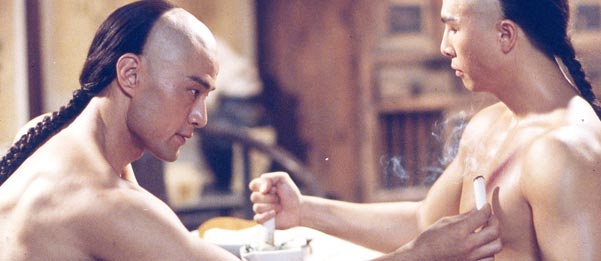
Similar to our Robin Hood, Wong Fei-Hung was a Chinese folk hero. A physician, martial artist and all round badass, he’s been the subject of over 100 movies with cinema legends Jet Li, Jackie Chan, Sammo Hung, and Gordon Liu all taking starring turns at the role. Specifically, Jet Li’s Once Upon a Time In China trilogy massively reinvigorated attention on the legendary character, and set up Li for future cinema mega-stardom in the early 90’s.
Indeed, the character has been heavily imprinted on the fabric of martial arts movie culture in China for nearly eighty years. So not only is Iron Monkey a story of a Robin Hood-styled night warrior, it’s also an origin movie of a cinematic legend. It shows a well known and beloved character in his formative years, and perhaps most significantly, features a girl in the role.
Director Yeun Woo-ping and producer/co-writer Tsui Hark both selected the then 14 year old Angie Tsang as she had both the martial skill and the fresh-faced look of a youth. Her only film to date, her abilities are brought to the fore in various scene.
So to the unknowing, it may appear strange that one of the sub characters of Iron Monkey gets so much screen attention and even their own theme music (there are echoes of the “Wong Fei-Hung” theme lifted directly from Once Upon a Time In China as tribute to the character).
This, along with many of the more comedic or political aspects of the movie were altered or fully cut from the original US release in 2001. A common practise by Hollywood distributors, this wouldn’t be the first time the character had been relegated thanks to unenlightened American editors; Jackie Chan’s hugely popular Drunken Master (Woo-pings second feature) is credited in The West as him playing “Freddy Wong” and not Fei-Hung. Thankfully, the excellent Eureka version restores Iron Monkey to its true glory.
One issue with restored older films is that you really can see everything that traditional film stock may have disguised. So modern audiences will likely notice the wire work at play straight from the outset. You’ll also encounter moments where the cameras are slightly undercranked to produce a faster effect; however, this is a common technique in Kung-Fu flicks of the era.
I think films like Ong Bak, released in 2003, which featured bone-crunching action in real speed without wires (or crash mats in some scenes) really turned a lot of people off to these classical cinema tricks. Iron Monkey is classical in many senses: it features very typical character archetypes (such as the stern father, corrupt official or bumbling sheriff). The inclusion of comedic elements is also common of wuxia (translated as ‘martial heroes’) films.
What elevates Iron Monkey though is the quality of the martial arts and the flair in the direction and choreography.
For example, it’s really cool how Woo-ping chooses to show that Yang is the Iron Monkey: when he and Orchid are closing up the clinic for the night, a gust of wind scatters the prescriptions he’d written out. Both he and Orchid fly up into the air to collect them in some crazy aerial ballet. Upon landing, Yang even manages to kick Orchid back into the air to collect the last few sheets.
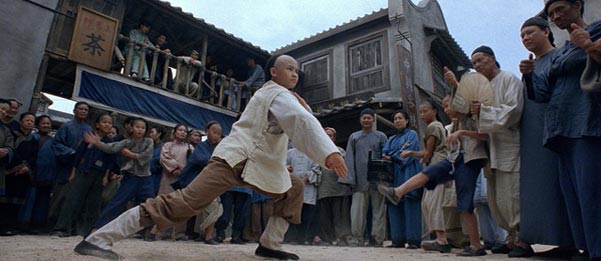
It’s the little stuff here too, like the small flicking motion he uses to drop the paperweight on the freshly collected stack, or how Orchid puts away the last remaining bench. Little flourishes like this permeate Iron Monkey throughout, and while not uncommon of the genre and this era of Hong Kong martial arts films in general, the execution here is really high level.
The fights take place in all sorts of locations too including roof tops, inside small houses, market places, using a variety of weapons such as chains, staffs and swords. Orchestrated with great precision, all the action is remarkably clear despite the speed. Yen’s martial ability is evident straight from the outset. While the Iron Monkey’s eponymous character is played by the great Yu Rongguang, Yen’s style shines the most.
Despite being in the business for nearly ten years prior to Iron Monkey’s release in 1993, this was one of Donnie Yen’s first major movies as star. Having appeared in the Tsui Hark directed follow up to Once Upon a Time in China as the villain opposite Jet Li, here he’d play the young, widower Father, struggling to raise a curious child in a dangerous world.
Iron Monkey also benefits from being shot by Arthur Wong, who has worked with all the greats; the lighting is rich and colourful, and each fall or impact or move is accompanied by camera movement to emphasise the speed or collision. He strikes a great balance between making the visuals both appealing and clear, something a lot of modern action movies could do well to learn from.
While Iron Monkey wasn’t a huge success at the time of release, it hardly harmed the careers of those involved. Donnie Yen is now a global movie star, starring in Star Wars: Rogue One and the immensely popular Ip Man movies. Soon after Iron Monkey, Yuen Woo-ping would make Fist of Legend with Jet Li, which attracted the attention of the Wachowski’s (directors of The Matrix series) in Hollywood. He was subsequently hired as the choreographer for the Matrix movies and then later Kill Bill. Perhaps his greatest success would come as martial arts choreographer for the Oscar winning Crouching Tiger, Hidden Dragon (whose sequel he’d later go on to direct).
Re-released as part of Eureka’s Classics range, it’s great to see Iron Monkey in all its’ glory and finally fully restored. Coupled with additional content such as insightful interviews with Donnie Yen (an incredibly knowledgeable guy) and Angie Tsang (adorable) among others, it’s a real treat.
Iron Monkey is a fun, well-made film. It wears a relatively small budget on its’ sleeve, but counters this limitation with dynamite action, incredible martial arts, great characters and a good story. It’s by no means dark or heavy like a lot of contemporary movies, yet still packs a punch when it needs to. I can see why Tarantino (who orchestrate the 2001 theatrical release in the US) was so enthusiastic about it.
Finally, if you haven’t already, you get to see why.
Iron Monkey is available to buy now from Amazon: http://amzn.to/2pze4Et
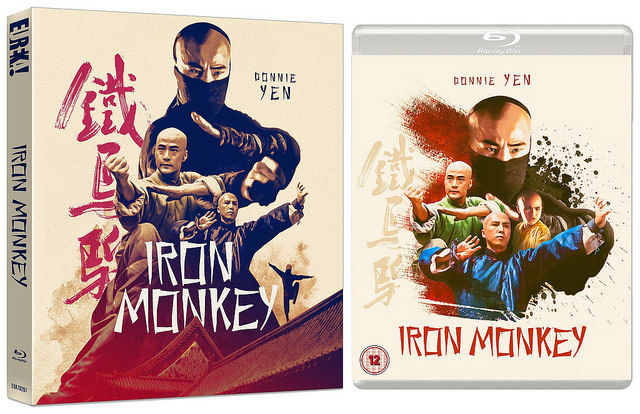
Blu-Ray Special Features:
· LIMITED EDITION O-CARD (First print run only)
· Stunning 1080p presentation from a brand new 2K restoration
· Original Cantonese mono audio track (also available in 5.1 presentation)
· 5.1 English audio track
· Isolated Music & Effects track
· Interview with Donnie Yen (20 mins)
· Interview with producer Tsui Hark (25 mins)
· Interview with Yu Rong-kwong (27 mins)
· Interview with stuntwoman and actress Li Fai (25 mins)
· Interview with actress Angie Tsang (20 mins)
· Iron Fist (16 mins) – A behind-the-scenes look at the action choreography of Iron Monkey
· Shadow Boxing (8 mins) – a featurette on Hong Kong action choreography featuring Alex Yip
· Footage of Li Fai and Angie Tsang competing at the 2003 Wu Shu Championships
· Original theatrical trailer
· A collector’s booklet featuring a new essay on the film (First print run only)
Great action
Very well shot
Doesn't take itself too seriously.
Perhaps a bit dated
Without context, the significance of some characters may be lost of some audiences.

